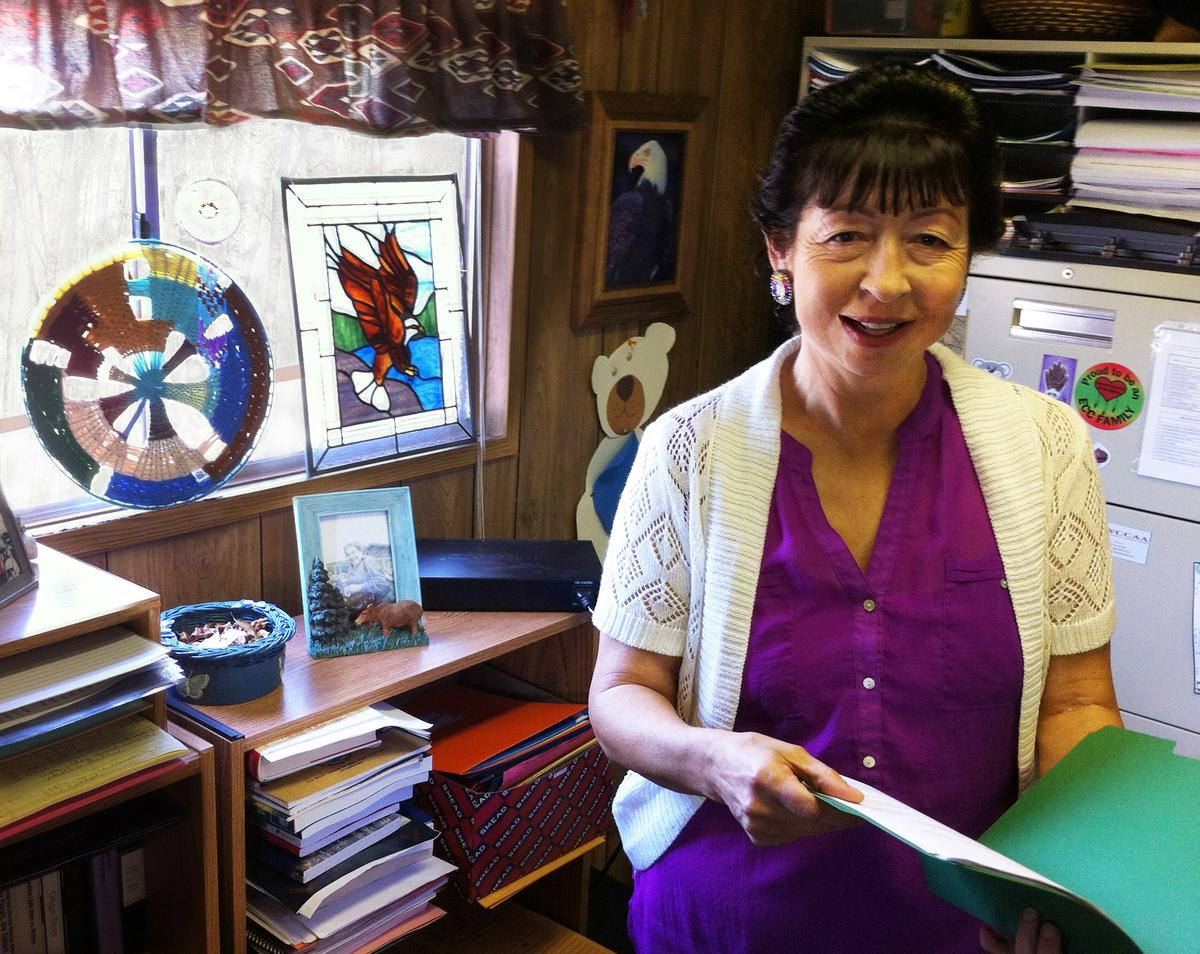Dee Gokee-Rindal B.A. '79, M.A. '86, Ed.D. '09, wants to teach children their native language and to honor their tribal culture. It's been her goal for decades. In 1994, she helped establish the first Tribal Head Start in Red Cliff, Wis., with one of the goals being Ojibwe language revitalization. "We learn more than words through language; we learn our values and traditions," she said. "It's my passion to restore the language to our Anishinaabe people here in Red Cliff."
Dee Gokee-Rindal B.A. '79, M.A. '86, Ed.D. '09, wants to teach children their native language and to honor their tribal culture. It's been her goal for decades. In 1994, she helped establish the first Tribal Head Start in Red Cliff, Wis., with one of the goals being Ojibwe language revitalization. "We learn more than words through language; we learn our values and traditions," she said. "It's my passion to restore the language to our Anishinaabe people here in Red Cliff."
That passion led her to a third academic degree from UMD, a doctorate in education. Gokee-Rindal, who is education division administrator for the Red Cliff Band of Lake Superior Chippewa, said it hasn't been easy. Before the Early Childhood Center (ECC) began its work with the Ojibwe language, only a few elders spoke Ojibwe.
LIVING THE LANGUAGE AT RED CLIFF
Now the youngest children help spread Ojibwe words. "When they started bringing home the language and teaching it to their families, more people wanted to learn," Gokee-Rindal said. The ECC set up a weekly Ojibwe language table for parents, staff, and the community. It continues today, led by Native speaker Rosie Debungie, assisted by Reggie Cadotte. There's room at the table for beginners and fluent speakers. The children who learned Ojibwe in the 1990s are back at the language table again, now parents with their own children enrolled in the program.
GROWING UP AT RED CLIFF
"Both sets of my grandparents were fluent Ojibwe speakers. But they did not teach the language to their children," Gokee-Rindal said. "They wanted us to succeed in a world where anything Indian was considered bad."
Gokee-Rindal was one of 14 children, seven boys and seven girls. "We didn't have running water until I was in high school," she said. "Our life was simple, but rich in knowing who we were." Her mother was a historian. "She knew her own family history and the history of the Red Cliff reservation," said Gokee-Rindal. "She also knew the history of Indian Country."
OFF TO COLLEGE
When Gokee-Rindal went off to UMD in 1975, her mother enrolled in Ashland's Northland College. Her mother graduated three years later; the same year the fourteenth Gokee child was born.
"We heard the messages from mainstream society that American Indians were dirty, stupid, lazy, and drunk," Gokee-Rindal said. "Of course, I knew it wasn't true. I went to UMD to prove that it wasn't true."
"I would’ve left UMD if it hadn’t been for Native student counselor George Himango and the Anishinaabe Club," she said. "All of us Native students had to deal with culture shock and discrimination — we supported each other." She is still close to the friends she made in the Anishinaabe Club.
POW WOWS AT UMD
The Anishinaabe Club was a force on campus. "When I was an undergraduate at UMD, the Anishinaabe Club sold fried bread and Indian tacos to raise money for the annual pow wow," Gokee-Rindal said. "We managed the whole event, which was held every year in May. We arranged for a spiritual advisor, the master of ceremonies, an arena director, flag carriers, head dancers, and a house host drum." It wasn't a competition type pow wow; it was open to the community. She said, "Everyone was invited to come in their finest regalia and share in the richness of our culture."
Gokee-Rindal received a bachelors degree in criminology and a master degree in psychology. She also received encouragement and support from teachers and administrators. "Ruth Myers was a staunch advocate for American Indian education and she was an inspiration to me," Gokee-Rindal said. Her favorite teacher was Walter Baeumler. "He welcomed my ideas and understood me. He survived the Holocaust in Germany," she said. "Like me, he had suffered a life of oppression; he had walked his own trail of tears." Their bond was solid. "When I graduated, he gave me two classical music albums as a gift."
FROM PASSION TO REALITY
"We've grown strong by teaching the language. We started the Head Start program with 23 children," Gokee-Rindal said. "Now we have 118. It was my dream to create opportunities for the community to learn Ojibwe, but it was the kids going home and speaking the language that made the change."
